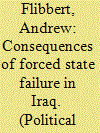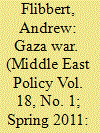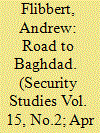| Srl | Item |
| 1 |
ID:
123085


|
|
|
|
|
| Publication |
2013.
|
| Summary/Abstract |
ANDREW FLIBBERT discusses the Iraq war and its aftermath. He argues that most of the pathologies in Iraqi political life since 2003, from sectarian mobilization to insurgent violence, are best understood as consequences of forced state failure. He contends that the war should not be viewed as badly conducted so much as badly conceived, claiming that the same ideas that led to the war also determined the shape of the peace in subsequent years.
|
|
|
|
|
|
|
|
|
|
|
|
|
|
|
|
| 2 |
ID:
104207


|
|
|
| 3 |
ID:
064455


|
|
|
| 4 |
ID:
076992


|
|
|
|
|
| Publication |
2006.
|
| Summary/Abstract |
Why did the Bush administration take the United States to war with Iraq in the aftermath of September 11, 2001? The constructivist approach used in this article to answer this question argues that the ideas of a handful of policy intellectuals affected political outcomes in remarkably consequential ways. These ideas shaped administration assessments of every major aspect of the Iraq war, beginning with its necessity and justification. Although the administration's ideational commitments were complex and evolving, four sets of ideas were central to its risk-filled gambit in the Middle East: a belief in the necessity and benevolence of American hegemony, a Manichaean conception of politics, a conviction that regime type is the principal determinant of foreign policy, and great confidence in the efficacy of military force. Taken together, these ideas defined the social purpose of American power, framed threats to the United States, and determined appropriate solutions to core problems. Ideas are not the sole factors setting the course of u.s. foreign policy, but they are essential to explaining an otherwise puzzling administration decision
|
|
|
|
|
|
|
|
|
|
|
|
|
|
|
|